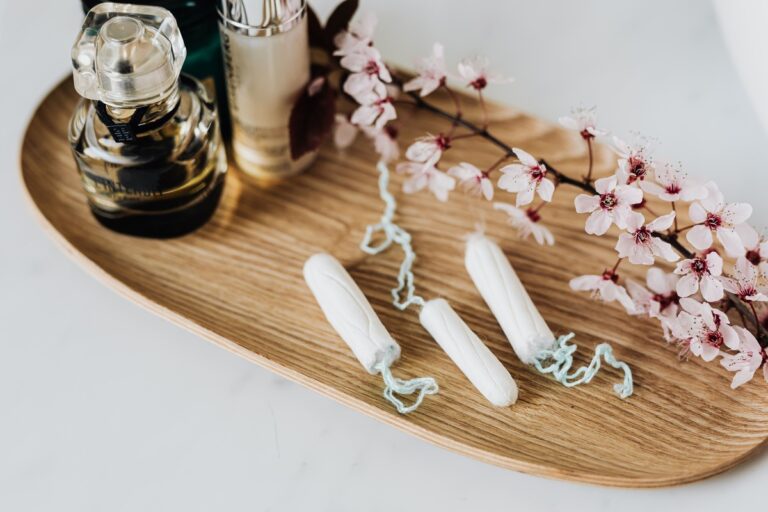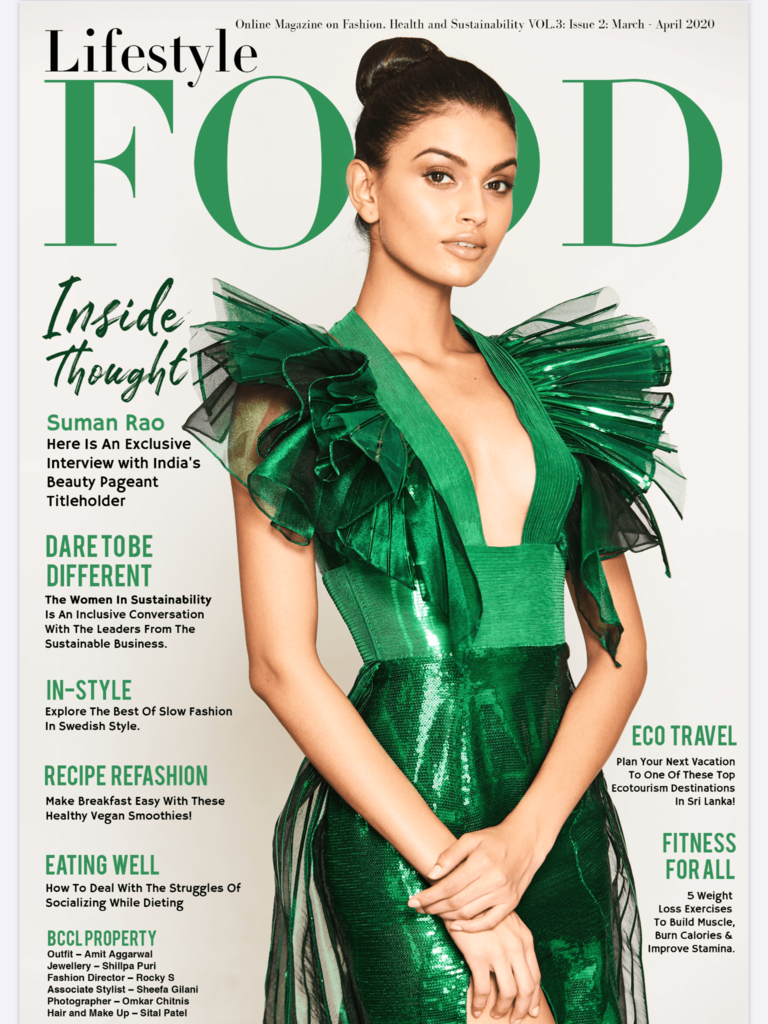How to be eco-friendly in your period?




If you’d like to be more eco-friendly during your period but don’t know where to begin, start with a sustainably sourced, ethically produced, environmentally friendly,chemical-free hygienic product like a menstrual cup, reusable pads, or tampons that are certified organic, free of bleaches, dyes, synthetic ingredients, petroleum derivatives, perfumes, and plastics.
Cut back on the amount of waste you produce during your period by limiting plastic in your Satatary pads, tampons, and period liner as plastic is non-biodegradable and takes at least 500 to 800 years for each pad or tampon to decompose.
Choose sustainable options when you purchase period products that are normally biodegradable and compostable. You can easily reduce your carbon footprint by opting for sustainable products over traditional disposable pads, they are also better for your skin as there is no bleach.
Why go for green periods?
We are concerned about single-use plastic and plastic straw but no one is talking about the plastic of Sanitary products. The Plastic in the sanitary pad takes a larger toll on the environment, the design of the pad has polyethylene plastic in it along with the adhesive, the tampons contain dioxin, chlorine, and rayon, and come with plastic applicators, and these items come packed in plastic as well, summing up the amount of plastic used and that of getting heaped in the landfills would take more than 800 years to degrade. Most of the time, they are not properly disposed of, and are flushed down the toilets causing sewage problems; later on, the sewage water released into the ocean harms aquatic life. At the same time, it would cause soil pollution and water contamination, further harming the environment. Apart from that Plastic cannot be recycled due to sanitary concerns.
Many sanitary products also contain fragrances, gels, and chlorine bleach, not to mention carcinogens, chemical by-products, and pesticides. these products are used in the intimate and sensitive parts of our bodies, these harmful substances often get absorbed by our genitals., especially if you’re concerned about the chemicals used in the products and their impact on your body and the environment. It’s time to think about period products that are more eco-friendly and less toxic for our bodies.
What are the green options?
Buying Greener period options is becoming more accessible with more sustainable options you can buy options based on your comfort, day of flow, budget, etc. Thanks to online shopping, you can buy period pads at the click of a button. it will be delivered to your doorstep in no time.
we rounded up feminine hygiene products still available to shop online with more sustainable options like period panties and menstrual cups including the pros and cons of each product —because there’s no time like the present to lean into alternative solutions. You finally have that push you needed to try greener options that you’ve been reading about or Maybe you’ll wind up liking these products better than your previous drugstore go-to’s.
we would recommend period products that are safe for you and the planet: disposable pads, tampons, and panty liners made from 100% organic cotton; menstrual cups made from 100% silicone; and reusable pads that are made primarily with 100% organic cotton. Which of those works best for you according to for your body and lifestyle like;
- Physical activity level
- Cost
- Sustainability – Reusable or disposable
- Time efficiency – How long can you wear the product?
Sustaina earlier known as Lifestyle Food Magazine debuted in March 2017, We are Asia’s FIRST-ever e-publication dedicated to sustainable living.
There is no doubt that disposable pads are always better than the reusable pads in terms of leak protection, but the Single-use disposable pads contain bleached wood pulp, adhesive, and petrochemical liner and 90% plastic which often lock up airflow, trapping heat and dampness, leading to rashes and other infections in our vaginal area.
Disposable pads contribute to plastic pollution and their disposable is a concern as single-use disposable pads contain plastic everywhere, from the plastic wrapper, the pad itself to the plastic backing over adhesive parts. think twice when disposing of pads as they are contributing to tonnes of menstrual waste ending in landfills.
If the reasons above aren’t convincing enough, consider the cost of those chemicals leaching into your skin and the amount of waste pollution they create are a big price to pay for the convenience of disposal and a few extra hours of leak protection.
Reusable pads made up of organic cotton that is sustainably grown on organic farms with strict farming practices with no use of herbicides and pesticides. It retains the natural softness and breathable quality of cotton.
While reusable pads bring instant relief to your skin and feel like you’re wearing cotton underwear. They’re cute and colorful and made up of organic cotton consider a sanitary pad that contains banana fiber for high absorbency and easy dryness layer the inserts if necessary. There is a wide range of options available online, you can try any from Reusable Cloth Menstrual Pads
Pros
- Switching to cloth pads means no plastic waste.
- No chemicals leach into your skin.
- Convenience disposal.
Con
- Changing in public can be awkward.
- Daily laundry and cleaning on your cycle;
- A limit to water sports.
Menstrual cups are inserted, like a tampon, and collect blood into the cup, which can then be removed, cleaned, and re-used. A menstrual cup is made out of silicone or rubber, meaning no chemicals potentially being leached. Unlike traditional sanitary, the Menstrual cup is reusable for years and it has a minimal impact on the environment. My suggestion would be to opt for Menstrual Cup Leak-Proof Protection. Have a period with no smell, no discomfort. once you are comfortable using it you can try other options.
Pros
- Environmentally-friendly, save the environment for packaging and material waste.
- They can hold equivalent of three to six disposable pads.
- One-time investment.
- Can be left about 12 hours longer than a conventional product.
- Easy with water sports.
Cons:
- learning and trying to get used to insertion and removal.
- Consult your doctor before using a cup if you have an IUD.
- Privacy issue, if you have to change them in a public washroom.
- Make sure you’re not exposed to any toxic chemicals while cleaning.
Period Panties absorbent underpants that are designed to absorb blood.
Some period panties are made up of synthetic fabrics, organic cotton, and spandex. These synthetic fibers do not break down in the environment, contributing to plastic pollution. Always consider breathable fabrics like cotton or hemp to make period panties leakproof and not trap moisture, increasing the chance of bacterial infection. My recommendation is to try Reusable, Leakproof Period Panty that you can easily use without pads or tampons for one or two years.
Pros:
- Environmentally-friendly.
- One-time investment
- Wear long-term without the worry of toxicity.
Cons:
- Daily laundry during your cycle.
- Changing in public can be awkward;
- Water sports are off-limits.
Not ready to switch to your conventional period options? Not a problem. Look for pads and tampons that are certified organic, free of bleaches, dyes, synthetic ingredients, petroleum derivatives, perfumes, and plastics, and ensure that consumer products are free of known toxic chemicals.
Eco-friendly disposable menstrual products are biodegradable and compostable (meaning your period waste won’t clog up dumpsites 400 years from now!). Compared with most conventional pads that are made up of mostly plastic, natural pads utilize organic cotton and vegetable-based cellulose. Check the various option of Compostable & Biodegradable Sanitary Pads.
Pros:
- Easy to wear.
- Can be worn for long periods of time.
- No upkeep or cleaning is required;
- Reliable protection.
Cons:
- Not cost-efficient because you purchase it every month.
- Not suitable for certain activities like exercise.
To help you get started, we’ve put together eco-friendly options with the top things to look for in period solutions. we recommend you find the best eco and vagina-friendly options that suit you, Think sustainable pads in public and period panties at home; reusable pads overnight and a menstrual cup during the day; organic tampons during activities and organic pads the rest of the time… you get an opinion.
Write in the comment box and share with us which eco-friendly period solution is suitable for you.